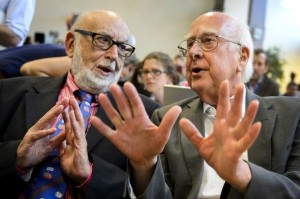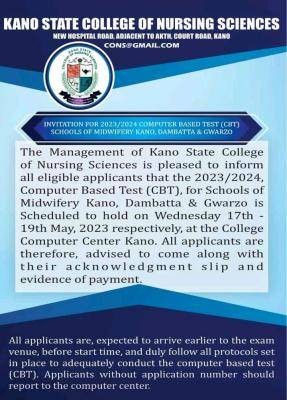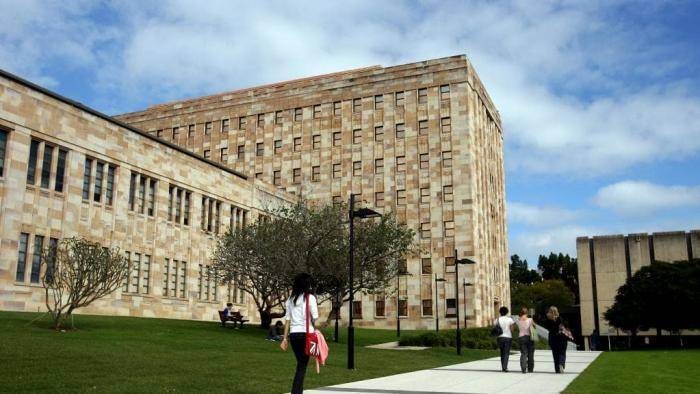
Two European scientists won the Nobel Prize in Physics for describing the Higgs boson, a theoretical particle that may explain where mass comes from and advances man’s understanding of how the world is constructed.
Peter Higgs, 84, a retired professor of theoretical physics at the University of Edinburgh, and Francois Englert, 80, a retired professor at the Free University of Brussels, will share the 8 million-krona ($1.25 million) prize, the Royal Swedish Academy of Sciences said today in Stockholm.
The particle is the final piece of the jigsaw in the Standard Model, a theory explaining how the universe is built, and its existence would help scientists gain a better understanding of how galaxies hold together.
“Some people have compared it to the discovery of DNA,” said Rolf-Dieter Heuer, the director-general at the European Organization for Nuclear Research, known as CERN. “It’s not so wrong. It’s one of the building blocks of our existence. It ranks pretty high in the discoveries of the past century.”
The boson is named after Higgs, one of six scientists who devised a working theory of how elemental particles achieve mass in a three-month period in 1964. Englert had been the first to publish the theory a month earlier, along with Robert Brout, a Belgian colleague who died two years ago and wasn’t eligible for Nobel recognition because it is limited to living recipients.
“I’m very, very happy to have the recognition of this extraordinary reward,” Englert said, speaking by phone to a press conference held at the science academy.
Higgs Hiding
Higgs didn’t return calls for comment, though he posted a statement on his university’s website.
“I am overwhelmed to receive this award,” he wrote. “I hope this recognition of fundamental science will help raise awareness of the value of blue-sky research.”
A native of Newcastle upon Tyne, England, Higgs is remaining “deliberately out of touch today,” according to Richard Ball, the scientist who succeeded him at the Higgs Centre for Theoretical Physics in Edinburgh. “He’s a modest man. He’s quite shy.”
The Nobel committee wasn’t able to reach him either.
“We’ll try to call him again later today,” said Olga Botner, a professor of experimental elementary particle physics at Uppsala University in Sweden and a member of the Nobel committee. “The rumor is that he’s gone into hiding because he knows that if he gets it there will be a press storm.”
Quarks and Leptons
Particle physics is the study of the elemental building blocks that make up matter. These particles, with names such as quark, fermion, lepton and boson, can’t be subdivided. They exist and interact within several unseen fields that permeate the universe.
Scientists are trying to prove the existence of the Higgs field by displaying a physical effect for the Higgs boson, a particle that lives for less than a trillionth of a second and is an excitation, or force, within the Higgs field.
Researchers at CERN said last year they had observed a particle that may be the boson. New results from the Large Hadron Collider in Geneva based on analysis of more data and presented at a conference in Italy this year “strongly indicate” that the particle discovered is indeed a Higgs boson, CERN said in March.
It’s Everywhere
“The particle itself is not as important as the theory -- the theory tells us why we exist -- it tells us why we don’t float away like a photon,” according to Botner. “The Higgs field is something that pervades the universe, it’s here in the room, it’s out there in black space, it’s everywhere.”
Higgs, speaking in July last year in the Old College at the University of Edinburgh, where he worked from 1960 until his retirement in 1996, said he didn’t expect the theoretical particle to be found in his lifetime.
“It’s very nice to be right sometimes,” he said then. Stephen Hawking, a British theoretical physicist who thought the boson wouldn’t be found, has said Higgs should get a Nobel.
At CERN, based near Geneva, “people just erupted in applause and shouts” when the names of the prize winners were announced, said Joe Incandela, a spokesman for the CMS experiment, one of the two that identified the Higgs boson. “As experimentalists we don’t go into this expecting a Nobel prize. For us the prize is the discovery.”
Englert, born in Etterbeek, Belgium, said he doesn’t yet know what he will do with the money. At a press conference at Free University, he expressed regret that Brout, his “close collaborator and friend,” wasn’t there to share the prize.
‘Lively Discussion’
The Nobel announcement was postponed by an hour, suggesting the committee took longer than expected to agree on a prize winner. The academy declined to give a reason for the delay.
“An academy should be a forum for lively discussion,” said Per Carlson, a former chairman of the Nobel committee and a professor of physics at the Royal Institute of Technology in Stockholm who was in the room. “I cannot go into the details.”
Last year’s physics prize went to Serge Haroche, from France’s Ecole Normale Superieure, and David J. Wineland, of the National Institute of Standards and Technology in Boulder, Colorado. They shared the award for the discovery of new ways to manipulate quantum particles without changing their nature.
Annual prizes for achievements in physics, chemistry, medicine, peace and literature were established in the will of Alfred Nobel, the inventor of dynamite, who died in 1896. The Nobel Foundation was established in 1900 and the prizes were first handed out the following year. The first physics Nobel was awarded to Wilhelm Roentgen for his discovery of X-rays.




